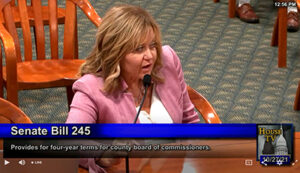County leaders, tell Senate to oppose privatization bid
 Bills that would create a damaging privatization scheme for the state’s local mental health services cleared a Senate committee this week.
Bills that would create a damaging privatization scheme for the state’s local mental health services cleared a Senate committee this week.
MAC is opposing this legislation and asking county leaders to engage with their senators with that message. (See below.)
Senate Bills 597-98, by Senate Majority Leader Mike Shirkey (R-Jackson) and Sen. John Bizon (R-Calhoun) respectively, cleared the Senate Government Operations Committee this week. Joining Shirkey in support of the bills were Sen. Dan Lauwers (R-St. Clair) and Sen. Aric Nesbitt (R-Van Buren).
The committee made several changes to SB 597, by Shirkey (R-Jackson), to the timeline for privatization to create a phased approach. The first phase focuses specifically on children, the second phase focuses on adults with serious mental illness (SMI) or severe emotional disturbance (SED), the third phase focuses on individuals with a substance use disorder diagnosis, and the fourth center son the intellectually and developmentally disabled population. There were only three phases initially, as the first phase originally included both children and adults with an SMI or SED diagnosis. Full financial integration would be extended from 2026 to 2030 to account for the revised timeline.
Additionally, the legislation requires that any General Fund money distributed to the CMHs or other providers, as determined by the state, must receive 100 percent of the intended reward — no administrative fees would be permitted.
MAC opposes any move to shift toward privatization of our local public mental health system. MAC has provided testimony to the committee and joined on a letter with criminal justice partners that share concerns. Shirkey indicated during committee these bills will move with a substantial mental health supplemental spending bill in the upcoming months, which was introduced this week as Senate Bill 714. MAC will oppose spending that is tied to passage of SBs 597-98.
To help make our case to the Senate, please use MAC’s email advocacy tool to send your message of opposition to your senator with just a single click. Feel free to customize the email as you see fit. Personal stories or examples of our local system success stories are extremely helpful.
Additionally, partners at the Community Mental Health Association of Michigan have advocacy tools you may wish to share with constituents or others.
A one-pager on the issue can be found here and provides bullet-pointed concerns of the legislation. A list of concerns, as well as a list of the groups in opposition, can be found here and used as you see fit.
For more information on this issue, contact Meghann Keit-Corrion at keit@micounties.org.
Senate sponsors, Allegan chair make case for 4-year terms to House committee

MAC’s Deena Bosworth fields a question on bills to extend commissioner terms at a Wednesday hearing in Lansing.
A bipartisan Senate duo engaged in a spirited discussion Wednesday with a House committee on their bills to move county commissioner terms to four years in length.
Sen. Ed McBroom (R-Dickinson) and Sen. Jeremy Moss (R-Oakland) were assisted in their advocacy for Senate Bills 242 and 245 by Allegan County Board Chair Jim Storey, who gave a historical overview of the term-length issue to the House Local Government Committee from his home studio.
During a broad philosophical discussion with committee members, McBroom and Moss detailed the growing demands on county boards in managing public affairs since two-year terms were established in the late 1960s and the disparity between commissioner terms and those for countywide elected officials and for township positions. The majority of the debate centered around the value of accountability with a two-year term election cycle and the need to minimize politics in favor of continuity and governance.
In his remarks, Storey also noted the wide array of county responsibilities and highlighted a very recent addition: managing aspects of the public response to COVID-19. “Today, as I converse with you, a new, massive duty has been added, counties are setting up and conducting testing and vaccination clinics for their residents … thousands of them. As a result, county boards across the state are wrestling with and devoting the time and attention to overseeing the delivery of these functions,” he said.
“These tasks and the many assigned by previous legislatures has made the job of county commissioner deeper and more important than ever before. Nor are these tasks simple one-offs. The ones enumerated require long range planning and attention to detail over several years to be successful and cost-efficient.”
Also speaking in support of the bills, a key MAC legislative priority for 2021, were Governmental Affairs Director Deena Bosworth and Oakland County Commissioner William Miller.
“Due to the lively debate, commissioner outreach to House members is essential if we want to move this forward,” said Bosworth noted.
The bills, which passed the Senate with broad, bipartisan support earlier in 2021, are expected to receive votes in the committee next week. In advance of that, MAC is urging all members to utilize our digital advocacy tool to send messages of support to their various state representatives, if they have not already done so.
MAC also thanks the 29 counties whose boards have passed resolutions of support: Allegan, Alpena, Bay, Berrien, Cheboygan, Clinton, Huron, Crawford, Delta, Dickinson, Emmet, Genesee, Houghton, Ionia, Isabella, Lenawee, Macomb, Manistee, Marquette, Mecosta, Newaygo, Oceana, Ogemaw, Ontonagon, Oscoda, Sanilac, Van Buren, Washtenaw and Wexford.
For more information on this issue, contact Deena Bosworth at bosworth@micounties.org.
Counties can aid coalition work on prosperity plan with resolutions
 As the campaign for the MI Prosperity Roadmap gains steam, MAC has developed a new tool for counties to use to support this plan for historic investments in Michigan’s public assets.
As the campaign for the MI Prosperity Roadmap gains steam, MAC has developed a new tool for counties to use to support this plan for historic investments in Michigan’s public assets.
A resolution template is now ready for counties to use to tout the specifics of the Prosperity Roadmap developed by the Coalition for a Strong and Prosperous Michigan, of which MAC is a founding member.
The clock is ticking, said MAC’s director of governmental affairs. “The time to reach out to legislators asking them to act is now,” Deena Bosworth emphasized. “The scope of local projects could drastically change if the state were to partner with us to improve our communities. We don’t want to be the last state to get money out the door; we will lose available labor to those states that are acting quickly.”
MAC staffers continue to meet with legislators to explain the plan to leverage state American Rescue Plan funds to invest in five key areas. And Executive Director Stephan Currie continues to explain the financial realities facing counties and others, this week to the Detroit News.
Be sure to visit MAC’s Prosperity Roadmap page for all the latest news on this effort.
For questions, contact Deena Bosworth at bosworth@micounties.org.
MAC urges U.S. House to adopt ARP flexibility measure

In a letter this week, MAC asked Michigan’s members of the U.S. House of Representatives this week to join the Senate by passing new legislation to increase a county’s flexibility in using American Rescue Plan Act (ARPA) funds.
The State, Local, Tribal, and Territorial Fiscal Recovery, Infrastructure and Disaster Relief Flexibility Act (S. 3011 and the identical H.R. 5735) would:
- Allow counties to allocate up to $10 million in ARPA Recovery Funds for the provision of government services without being required to calculate revenue loss
- Allow $10 million (or 30 percent) of a county’s ARPA Recovery Fund allocation to be used for infrastructure-related activities authorized under existing federal surface transportation laws or a Community Development Block Grant project
- Allow ARPA Recovery Funds to provide emergency relief from natural disasters and their negative economic impacts, including temporary emergency housing, food assistance, financial assistance for lost wages or other immediate needs
MAC thanks U.S. Rep Peter Meijer (R-Grand Rapids) for his co-sponsorship of the House version.
The National Association of Counties (NACo) has created a resources hub in support of the legislation, including a letter template that counties can use.
Also, be sure to visit MAC’s ARP Resources Page for the latest news and events.
Huge House majority backs 911 funding changes
 The Michigan House, by a huge majority, approved a 911 funding bill, House Bill 5026, this week and sent it to the Senate Energy and Technology Committee. The bill would ensure authorization for Michigan’s 911 operation continues and is appropriately funded. The sunset on the fee structure would be extended through Dec. 31, 2027.
The Michigan House, by a huge majority, approved a 911 funding bill, House Bill 5026, this week and sent it to the Senate Energy and Technology Committee. The bill would ensure authorization for Michigan’s 911 operation continues and is appropriately funded. The sunset on the fee structure would be extended through Dec. 31, 2027.
As passed, the bill would act as budget implementation for a $16 million one-time appropriation in FY22 to the state 9-1-1 fund to fill a hole created by prepaid revenue coming in lower than expected. The appropriation allowed the fee for postpaid (contract) phones to remain at 25 cents. Beginning March 1, 2022, prepaid phone fees would increase from 5 percent to 6 percent to ensure equity among revenue sources.
Additionally, the bill includes a review of prepaid fee revenue by Treasury to determine why prepaid phone revenue has been lower than expected. It also has a mechanism to trigger a roll back in fees if revenue is higher than expected.
MAC supports the legislation. A county template resolution and talking points can be found here.
For questions, contact Meghann Keit-Corrion at keit@micounties.org.
Bills to address medical staffing crisis clear House
 A medication aide training and registration program would be created in Michigan under a bill that passed the House of Representatives this week.
A medication aide training and registration program would be created in Michigan under a bill that passed the House of Representatives this week.
House Bill 4316, by Rep. Ben Frederick (R-Shiawassee), passed 56-48. Under its provisions, the medication aide would administer regularly scheduled medications to residents of a nursing home while under the supervision of a registered nurse or licensed practical nurse. While not a complete solution to the long-term care staffing crisis, this is intended to allow nurses more time for specialty care.
The training program and permitting of medication aides would go through the state’s Department of Licensing and Regulatory Affairs (LARA). Practice as a medication aide would not include the practice of nursing and would not include administering controlled substances, administering medications in injectable forms, the initial administration of medications or the administration of “as needed” medications. More than 20 other states allow medication aides in skilled nursing facilities.
A similar bill passed the Legislature last year but was pocket-vetoed by the governor.
The version that passed the House includes a “sunset” of Dec. 31, 2026, a set date in time when the law would expire unless further legislative action was taken, to help ensure the measure was working as expected. The bill is now before the Senate Health Policy and Human Services Committee chaired by Sen. Curt VanderWall (R-Mason).
The House easily passed another bill, House Bill 5089, by Rep. Ann Bollin (R-Livingston), to allow the state to recognize on-the-job training by counting it toward certification requirements that are required for nursing facility staff. The bill adds an alternative option for demonstrating competency to LARA. Instead of successfully completing a competency examination approved by LARA, the applicant could successfully complete an assessment performed by a site administrator responsible for assessing the applicant’s competency skills or by the entity hiring the applicant, as long as those assessments were determined by LARA to meet federal requirements. LARA would have to allow an applicant to complete a competency examination online or through remote means.
HB 5089 also has moved to the Senate Health Policy and Human Services Committee.
The Michigan County Medical Care Facilities Council, which represents the county-owned skilled nursing facilities in the state, supports both bills.
For more information on this issue, contact Meghann Keit-Corrion at keit@micounties.org.
House passes bill to limit local control on short-term housing rentals
 A bill that largely strips local governments’ ability to regulate short-term housing rentals passed the House this week in a late-night session.
A bill that largely strips local governments’ ability to regulate short-term housing rentals passed the House this week in a late-night session.
House Bill 4722, by Rep. Sarah Lightner (R-Jackson), advanced on a 55-48 vote this week. The legislation states short-term rentals can’t be banned, be subject to a conditional use permit or be considered a commercial property. However, local governments can limit the percentage of units that can be designated a short-term rental to 30 percent of housing stock in their jurisdictions.
Local governments also, under the bill, can regulate noise, advertising and traffic through an ordinance. And the legislation sets a limit on the number of such rentals by a property owner (2) and the number of days a renter can occupy a unit (30).
MAC has not taken a position on the bill and will continue to monitor this legislation as it now moves to the Senate Regulatory Reform Committee.
For more information on this issue, contact Deena Bosworth at bosworth@micounties.org.
County views sought on juvenile justice system

Michigan has formed the Taskforce on Juvenile Justice Reform to identify what is working well in the juvenile justice system and to identify opportunities for statewide improvement. The Council of State Governments (CSG) Justice Center — a national nonprofit that works with state and local governments across the country — is the technical assistance provider to the taskforce. On behalf of the taskforce, the CSG Justice Center is conducting a comprehensive assessment of local and state juvenile justice policies, practices and funding, and will submit a report of findings and recommendations by next summer. As part of this assessment, the CSG Justice Center is facilitating focus groups with key stakeholders across the state to hear directly from them about juvenile justice system strengths and challenges.
Two focus groups have been scheduled specifically to solicit feedback from county commissioners and their staffers, including:
- Nov. 16, 2 p.m.-3 p.m. Eastern
https://csg-org.zoom.us/j/87417802335?pwd=MVFoZVF6TlF3L3REb1cwZjZkVFI0dz09
Meeting ID: 874 1780 2335
Passcode: 751571
+13017158592,,87417802335#,,,,*751571# US (Washington DC)
+13126266799,,87417802335#,,,,*751571# US (Chicago)
- Nov. 30, 10 a.m.-11 a.m. Eastern
https://csg-org.zoom.us/j/83895764435?pwd=Sy9WTStOMVRBSndiNmhJZTBKYzNjZz09
Meeting ID: 838 9576 4435
Passcode: 112059
+13126266799,,83895764435#,,,,*112059# US (Chicago)
+16465588656,,83895764435#,,,,*112059# US (New York)
We encourage you to join one of these focus group discussions so you can provide input that may ultimately inform statewide legislative, funding and administrative changes to improve public safety and youth outcomes. If you are unable to join either of these meetings but are still interested in providing feedback, please contact MAC’s Meghann Keit-Corrion at keit@micounties.org.
Survey: Local leaders still see much uncertainty on COVID’s course
 A significant share of county leaders reported still seeing “crisis-level” impacts from COVID-19 in a survey just released by the University of Michigan.
A significant share of county leaders reported still seeing “crisis-level” impacts from COVID-19 in a survey just released by the University of Michigan.
The Michigan Public Policy Survey (MPPS) is performed by the Center for Local, Urban and State Policy (CLOSUP) at U-M and done in partnership with MAC, the Michigan Municipal League and the Michigan Townships Association.
“By jurisdiction type, county officials are by far the most likely to report significant (53%) or crisis-level
(8%) impacts continuing in their jurisdictions in 2021 … Meanwhile, 41% of city officials, 30% of village officials, and 25% of township officials say their communities continue to suffer severe impacts of COVID-19 this year,” wrote the report authors.
“While the numbers of communities reporting on the full range of impacts from the pandemic — public health, the economy, residents’ welfare and public service delivery, among others — are significant, they show improving conditions amid uncertainty, the authors added.
The spring 2021 MPPS reached 1,364 leaders of counties, municipalities and townships and responses were collected April 5 and June 7.
“The pandemic has taken a terrible toll on communities across Michigan,” said Tom Ivacko, executive director of CLOSUP in a university release. “We see the continuing effects particularly in the largest population areas in the southeast as well as in communities across the Upper Peninsula. After more than a year, there remains uncertainty about how and when they will emerge from the economic and health challenges they have faced.”
Treasury provides actuarial assumptions for FY22
 A key component of the Protecting Local Government Retirement and Benefits Act (Public Act 202 of 2017) requires the State Treasurer to annually establish uniform actuarial assumptions for local governments in Michigan who offer a defined benefit retirement system(s) (pension or retirement health care). Below is a link to a draft of the fiscal year 2022 uniform assumptions that are being made available for public comment.
A key component of the Protecting Local Government Retirement and Benefits Act (Public Act 202 of 2017) requires the State Treasurer to annually establish uniform actuarial assumptions for local governments in Michigan who offer a defined benefit retirement system(s) (pension or retirement health care). Below is a link to a draft of the fiscal year 2022 uniform assumptions that are being made available for public comment.
Fiscal Year 2022 Uniform Assumptions
This document provides the rationale for how the assumptions are determined as well as a table that provides a summary of the relevant changes. Following a 30-day public comment period, the uniform assumptions will be released to be used in fiscal year 2022 Public Act 202 of 2017 reporting.
If you would like to offer comment on these draft uniform assumptions, please email LocalRetirementReporting@michigan.gov by Nov. 26. Treasury will review and consider your comments before finalizing the fiscal year 2022 uniform assumptions.
Additionally, the Michigan Department of Treasury has developed a webpage with numbered letters, memorandums, webinars, and resources regarding COVID-19 updates for local governments and school districts. This webpage was created to ensure that Michigan communities have access to the most up-to-date guidance and is updated frequently with information and resources as they become available.
State-local collaboration will assist on resiliency
 A collaboration of local government groups and the state is renewing efforts to support communities in their work to adapt to changing weather patterns, reduce energy use and save money and resources.
A collaboration of local government groups and the state is renewing efforts to support communities in their work to adapt to changing weather patterns, reduce energy use and save money and resources.
The Michigan Green Communities (MGC) program is backed by MAC, cities, townships and three state agencies. All Michigan counties are eligible to join the MGC network and take the MGC challenge. Receive support in your community’s sustainability journey by joining the Michigan Green Communities network. Learn more about MGC program here.
The revamped Michigan Green Communities includes:
- Updated MGC Challenge – Launching January 2022 on the MGC website
- Virtual Networking Platform – Launching early 2022 on the MGC website
- MGC coordinator to assist communities in finding technical assistance and resources to achieve your community’s sustainability goals
MAC encourages members to sign up for the MGC Challenge and begin your sustainability journey.
For more information, contact Hannah Sweeney at sweeney@micounties.org or MGC Coordinator Danielle Beard at dbeard@mml.org.
 Staff picks
Staff picks
- IPPSR report analyzes new election maps (Institute for Public Policy and Social Research)
- Kirtland’s warbler census shows once-endangered songbird continues to thrive (Michigan Department of Natural Resources)
- Citizens Research Council testimony to Senate Oversight Committee (video) (Michigan Senate)
- Stimulus funds help Virginia, Vermont build broadband equity (Governing)
